Related Research Articles
James Hamilton, 1st Earl of AbercornPC (S) (1575–1618), was a Scottish diplomat for James VI and an undertaker in the Plantation of Ulster in the north of Ireland.
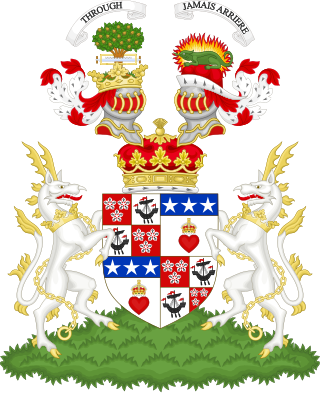
Duke of Hamilton is a title in the Peerage of Scotland, created in April 1643. It is the senior dukedom in that peerage, and as such its holder is the premier peer of Scotland, as well as being head of both the House of Hamilton and the House of Douglas. The title, the town of Hamilton in Lanarkshire, and many places around the world are named after members of the Hamilton family. The ducal family's surname, originally "Hamilton", is now "Douglas-Hamilton". Since 1711, the dukedom has been held together with the Dukedom of Brandon in the Peerage of Great Britain, and the dukes since that time have been styled Duke of Hamilton and Brandon, along with several other subsidiary titles.
William Sinclair (1410–1480), 1st Earl of Caithness (1455–1476), last Earl (Jarl) of Orkney, 2nd Lord Sinclair and 11th Baron of Roslin was a Norwegian and Scottish nobleman and the builder of Rosslyn Chapel, in Midlothian.

Earl of Carlisle is a title that has been created three times in the Peerage of England.

Lord Ruthven of Freeland is a title in the Peerage of Scotland. It was created in 1651 for Thomas Ruthven. He was the grandson of Alexander Ruthven, younger son of William Ruthven, 2nd Lord Ruthven. The letters patent creating the peerage is said to have been burnt with the House of Freeland in 1750, and the remainder to the peerage is not accurately known. However, as the dignity was retained on the Union Roll, it has been presumed that the honour was to heirs-general.

Earl of Gowrie is a title that has been created twice, once in the Peerage of Scotland and once in the Peerage of the United Kingdom, both times for members of the Ruthven family. It takes its name from Gowrie, a historical region and ancient province of Scotland. On 23 August 1581, William Ruthven, 4th Lord Ruthven, was created Earl of Gowrie by James VI, King of the Scots. He was executed for high treason, attainted and his peerages forfeited on 28 May 1584. Two years later in 1586, the attainder was reversed and his son, the second Earl, was restored as Earl of Gowrie and Lord Ruthven, but both peerages were forfeited after the alleged plot and subsequent death of the second Earl's younger brother, the third Earl, in 1600.

Lord Balfour of Burleigh, in the County of Kinross, is a title in the Peerage of Scotland. It was created in 1607 for Sir Michael Balfour.

Earl of Brentford was a title that was created twice in Peerage of England. It was first created in 1644 when the Scottish soldier and diplomat Patrick Ruthven, 1st Earl of Forth, was made Earl of Brentford, in the County of Middlesex. He had already been created Lord Ruthven of Ettrick in 1639 and Earl of Forth in 1642, both in the Peerage of Scotland. He had no surviving male issue and the titles became extinct on his death in 1651. Lord Brentford was a great-grandson of William Ruthven, 1st Lord Ruthven. His brother William Ruthven was the grandfather of Francis Ruthven, who was created a Baronet, of Redcastle, in 1666. The latter married Elizabeth, daughter of Thomas Ruthven, 1st Lord Ruthven of Freeland, great-grandson of William Ruthven, 2nd Lord Ruthven. Their daughter, Isabel, succeeded as 5th Lady Ruthven of Freeland in 1722.
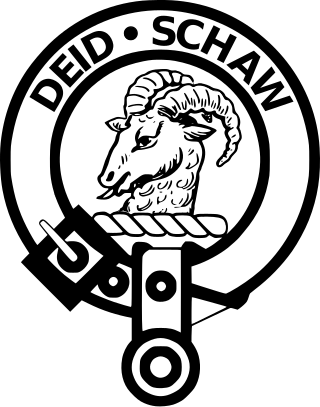
The Clan Ruthven is a Lowland Scottish clan.
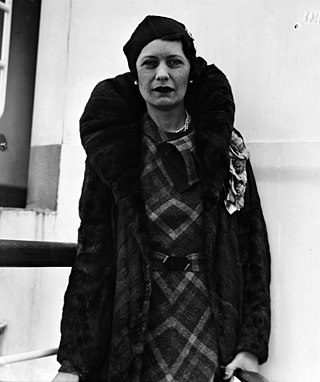
Bridget Helen Monckton, 11th Lady Ruthven of Freeland, Dowager Viscountess Monckton of Brenchley, CBE was a British peeress and Conservative member of the House of Lords best remembered as the wartime commander of women's services in India.
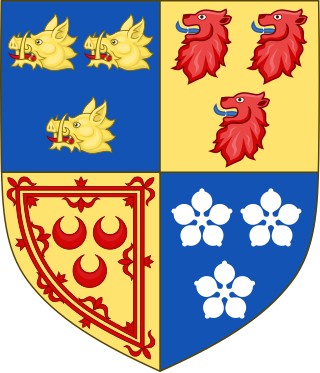
Alexander Seton, 1st Earl of Huntly, who adopted the family name of Gordon from about 1457, was a powerful 15th-century Scottish magnate. He was knighted in 1439/1440 and was Lord of Badenoch, Gordon, Strathbogie and Cluny.
William Douglas, 1st Marquess of Douglas and 11th Earl of Angus (1589–1660) was a Scottish nobleman.
Walter Campbell, 3rd of Shawfield and Islay and 9th of Skipness was a Scottish landowner, advocate and Rector of Glasgow University.

Marcus Beresford, 1st Earl of Tyrone, known as Sir Marcus Beresford, 4th Baronet, until 1720 and subsequently as The Viscount Tyrone until 1746, was an Anglo-Irish peer and politician.
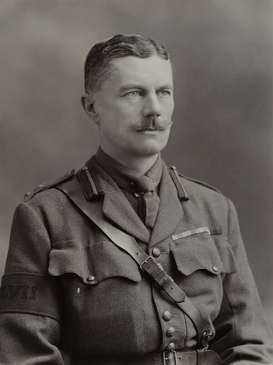
Major General Walter Patrick Hore-Ruthven, 10th Lord Ruthven of Freeland, 2nd Baron Ruthven of Gowrie,, known as Master of Ruthven from 1870 to 1921, was a senior British Army officer. He served as Major-General commanding the Brigade of Guards and General Officer Commanding London District from 1924 to 1928, and was then Lieutenant Governor of Guernsey until 1934.
James Balfour, 1st Baron Balfour of Glenawley or Clonawley, was a Scottish nobleman and courtier who was one of the chief undertakers in the Plantation of Ulster. His third marriage to Anne Blayney caused a notable scandal.
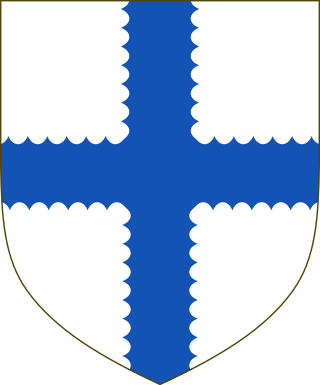
Henry Sinclair was a Scottish nobleman and the 6th Lord Sinclair. In The Scots Peerage by James Balfour Paul he is designated as the 5th Lord Sinclair in descent starting from William Sinclair, 1st Earl of Caithness and 3rd Earl of Orkney, but historian Roland Saint-Clair designates him as the 6th Lord Sinclair in descent from the father of the 1st Earl of Caithness and 3rd Earl of Orkney, Henry II Sinclair, Earl of Orkney, who is the first person recorded as Lord Sinclair in public records. Roland Saint-Clair references this to an Act of the Scottish Parliament in which the 4th Lord Sinclair was made Lord Sinclair based on his descent from his great-grandfather, Henry II Sinclair, Earl of Orkney, the first Lord Sinclair. Bernard Burke, in his a Genealogical and Heraldic Dictionary of the Peerage and Baronetage of the British Empire, agrees with Roland Saint-Clair and says that Henry Sinclair's father, William Sinclair, was "in reality" the fifth Lord Sinclair.
Patrick Balfour, 2nd Baron Kinross KC was a Scottish peer and advocate.
Walter James Hore-Ruthven, 9th Lord Ruthven of Freeland, 1st Baron Ruthven of Gowrie, previously known as Walter James Hore, was a British soldier and peer, a member of the House of Lords from 1919 until his death.
References
- ↑ Lodge, Edmund (1834). The Genealogy of the Existing British Peerage, with Brief Sketches of the Family Histories of the Nobility. With Engravings of the Arms. p. 385.
- ↑ Burke, John, ed. (1885). Burke's Genealogical and Heraldic History of the Peerage, Baronetage and Knightage. Burke's Peerage Limited. p. 1152.